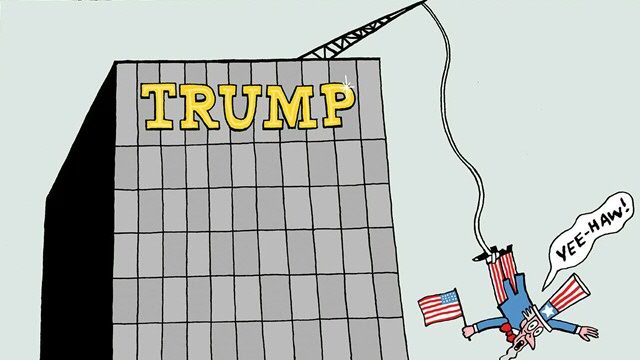Leap into the unknown

Forget the ill-educated, angry white male. Donald Trump became president thanks to a blind urge for change among large portions of the electorate, says Eelco Runia. ‘Right-thinking citizens’ have often been caught off balance like this throughout history.
With Donald Trump’s election victory last November, world history has gained a myth – that of the ill-educated, angry white male who ensured that Trump became president. Historian, psychologist and writer Eelco Runia calls this explanation ‘short-sighted'. ‘It might perhaps fit the prejudices the Democrats already had, but doesn't do justice to what's actually going on.’
In an opinion piece that appeared in the NRC newspaper on 17 December, Runia referred to the Italian humanists from around 1500 and later in the 16th century who ‘were at their wits’ end on how to deal with the Trumps of their time: Cesare Borgia and Pope Julius II. They made no effort whatsoever to be reasonable and were successful nonetheless. The humanists considered them loose canons, bully boys: they allowed themselves to be driven by passion, were easily offended and bore grudges, rubbed people up the wrong way, were vain and pretentious and seemed to be oblivious to their own best interests . According to Runia, this inspired Machiavelli to distance himself from humanist ‘right-thinking’ and to develop a political doctrine based on the insight that Cesare Borgia and Pope Julius II were successful not despite but because they took no notice of ragione (reason) and gave free rein to virtù (audacity).
‘Entitlement’
The fact that the Democrats and other ‘right-thinkers’ did not see Trump’s victory coming is due to their feeling of what Runia calls ‘entitlement’– the idea that the Democrats had that they ‘deserved’ victory in the elections. ‘That is rooted in the neoliberal thinking that emerged under liberals in the USA and social-democrats in Europe during the 1980s. Clinton, Blair and Kok regarded neoliberalism as virtually inevitable. ‘The Democrats thought that it was simply a question of waiting until demographic and cultural changes had taken place to be sure of a sort of permanent electoral majority. Minorities, youth and the highly educated would have such enormous electoral potential for the Democrats that power would more or less be thrown into their laps.’ This view makes a significant mistake, however – people do not always vote in their own best interests, something that the Democrats, and with them many others, assumed they did.
Populism
Runia explains this from an elementary need for change. ‘In previous work I examined how the First World War could have broken out, and how revolutions occur. One recurring factor was that people sometimes set their rationality aside in the blind urge to take a great leap into the unknown. And they did so even when they could already see that it was not in their own interests and that disaster, unrest and poverty would be the result. Taking such a leap in the dark is an elementary, psychological need that is consistently underestimated by historians.’
That people wanted to take such a leap with Trump is because the government had unilaterally cancelled the ‘meritocratic contract’ with its citizens. The idea behind a meritocracy is that the socioeconomic position of every individual is based on his or her merits: ‘In her book Strangers in Their Own Land, about the Tea Party ideology, Arlie Russell Hochschild conjures up the image of a line of patiently waiting people. They watch other people jumping the queue and the government facilitating this and in a way even encouraging them. That results in enormous antagonism towards the government and the queue-jumpers.’ That image, according to Runia, is characteristic of present-day populism, in the Netherlands and the rest of Europe as well. ‘Everyone to whom special policy applies is regarded as a queue-jumper: foreigners who get priority for rented accommodation, women suddenly working at men’s jobs. As a result many populism supporters feel passed over. The government obliges obedient citizens to conform to the meritocratic contract but does not do so itself and allows other groups to break the rules too. In my opinion that is at the root of the wave of populism we are currently experiencing.’
Regime change
Runia considers it his duty as a historian to follow present-day populism as consciously as possible. ‘The fact that I have organized three pop-up symposia about populism is also due to the realization that we are living in historic times. I try to make room for that in my lectures in all kinds of ways. I’ve already announced that I want to give a seminar on regime change next academic year. So I’m expecting lots of things to happen. It’s by no means certain that Trump will actually last four years.’ That sounds rather ominous. Luckily Runia has some good news for opponents of populism in the Netherlands: ‘Wilders’s attitude will prevent him gaining a larger electoral support base than he already has.’ By constantly playing the racism card, Wilders is doing himself and his supporters an injustice, because the potential for change is gigantic.’
Eelco Runia (1955) has been a university lecturer in Modern History and Theoretical and Intellectual History at the UG since 2003. He studied history and psychology at Leiden University. His 1995 PhD thesis, ‘De pathologie van de veldslag’ [The pathology of battle], was nominated for a Gouden Uil award. The main theme in Runia’s work in his opinion is ‘the scandal of discontinuity’.
Text: Bert Platzer
Cartoon: Bas van der Schot
Source: Broerstraat 5, the alumni magazine of the University of Groningen
